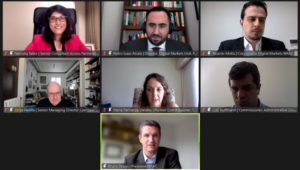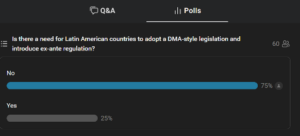

On March 16, Access Partnership, a global public policy firm, together with the Brazilian Institute of Studies on Competition, Consumer Affairs and International Trade (IBRAC), hosted the event “Digital Transformation and Competition Regulation: The Latin American Perspective”. The webinar brought together an impressive line-up of competition experts from Argentina, Brazil, Mexico and Spain, who shed light on new regulatory proposals being discussed in Europe and the U.S., and potential implications for consumers and businesses in Latin America.


The panel was led by Nimisha Tailor, Access Partnership’s Senior Consultant, and Ricardo Motta, Coordinator of IBRAC’s Digital Markets Committee. Jorge Padilla, Senior Managing Director at Compass Lexecon EMEA delivered a keynote presentation on the approaches that Europe and the U.S. are taking regarding competition and regulation. He pinpointed the theories and schools of thought that underlie current approaches to competition policy and argued that while the neoclassical approach incorrectly stated that markets would eventually self-regulate, the neo-Brandeis movement’s response advocating for more severe intervention and regulations on the so-called “digital markets” is not the answer and does not challenge the neoclassical approach’s core precepts. Padilla recommended not abandoning the neoclassical approach but instead adapting it, taking into account lessons learned over the past few years. Care must be taken to avoid overregulation, which could undercut economic growth and limit innovation in Latin American countries.
“I disagree with the neo-Brandeisians view on antitrust that say ‘large [companies are] always bad’”
Jorge Padilla
When questioned about the negative social outcomes that critics associate with market concentration, Padilla stated that:
“Antitrust is not the only tool, and not even the most important one. Some of the factors that explain those dynamics have nothing to do with antitrust”
Jorge Padilla
The webinar also featured a panel debate with Latin American competition officials that included Luiz Hoffmann, Commissioner at the Administrative Council for Economic Defense (CADE) from Brazil, Maria Fernanda Viecens Former Commissioner at the National Commission for Competition Defense (CNDC) from Argentina, and Pedro Isaac Alcalá Berhouague, Director at the Federal Economic Competition Commission (COFECE) from Mexico.
Luiz Hoffmann explained that in Brazil, the approach to “digital markets” is reviewed on a case-by-case basis and is carried out by sectoral regulatory authorities. According to Hoffmann, there is no specific digital market antitrust regulation being debated in Brazil, and incumbents often embrace technology to adapt their business models and improve operations.
María Fernanda Viecens presented her perspective from Argentina, providing an overview of the nation’s fintech sector and the government’s reluctance to pursue regulation that would be detrimental to investment and innovation. In addition, she pointed out that firms providing innovative services such as ecommerce tools and online marketplaces challenge entrenched incumbents, forcing them to compete. This, in turn, enhances competition and innovation particularly in sectors such retail, where the line between online and offline is blurred.
“Many traditional markets in the region are characterised by high levels of concentration and strong incumbents. Digital agents […] improve the competitive performance in these traditional markets”
María Fernanda Viecens
Luiz Hofmann added that this was also the case in Brazil, where:
“An example of a highly competitive sector is retail”
Luiz Hoffmann
Pedro Isaac Alcalá Berhouague began his presentation by summarising the structural conditions in Mexico regarding broadband network connectivity and digital literacy. He stated that, while Mexico is advancing its digital transformation efforts, the process is recent, and it is still a long way from matching the existing conditions of more developed countries. He pointed out that innovation markets are not unknown to COFECE, and that the competition authority can successfully apply the existing tools to the new ways of doing business. Due to this, new legislation is not likely to be introduced in the near future.
“It is very important to consider how digital markets are working in Mexico […] Markets may be tipping in the following years, [but] in Mexico we have not reached that point”
Pedro Isaac Alcalá Berhouague
During the event, a poll was carried out which asked for the audience’s perspective on ex-ante regulation in the region. 75% of the 60 respondents believed that there is no need for Latin American countries to adopt a DMA-style legislation and introduce ex-ante regulation.


The recording of the event can be accessed here.